The New World & The Commerce Inn
The Menu, Gourmet Flux, The Commerce Inn, and Via Carota cookbook
i. short takes
Ii. restaurant review: the commerce inn
iii. the new world
iv. via carota cookbook
v. dining complaints
FLUX GOURMET (Peter Strickland) merges bodily functions and conceptual formalism to produce an esoteric and uniquely bizarre movie about artistic, and gastric, suffering—flatulence abounds. British filmmaker Strickland turns his lens on a collective of “sonic caterers,” who coax music from food as performance art. They amplify sizzles and splatters, the gurgling of pots and slicing of knives, which doesn’t quite have the soothing affects of asmr, since its members, plus the institute director and journalist, are engaging in their own power struggles.
Chefs, too, might be considered artists, and THE MENU (Mark Mylod) zealously explicates the mutually parasitic, and class-motivated, relationship between the high-end restaurant world and its guests. The rich have reduced fine-dining to a series of power plays, in the process obliterating the joy for Chef Slownik (Ralph Fiennes, taking a page out of the Mark Rylance playbook as a savant with a faraway look in his eye). The movie unfolds during an exclusive tasting menu dinner, held on remote island in the Pacific Northwest, where the food is realistically upscale, but the dining room unremarkable. The film’s targets are criminally wide and woefully generic (business bros) with the focus on a foodie tryhard (Nicholas Hoult, appropriately raring) and his mystery date (Anya Taylor Joy). The dialogue is silkily verbose and every moment screams SATIRE (Mylod, is an executive producer for Succession, and the writers’ credits include in Late Night with Seth Meyers), but the actors make it work—among them, Hong Chau as the devoted maitre’d refusing people bread.
Read my interview with Hong, about the film and her banner year, for Vogue.
SHORT TAKES
BARBARIAN (Zach Cregger) is like that X-Files episode “Home,” glazed in intergenerational and gendered dread, where women are feared instead of adored.
The Romanian film INTREGALDE (Radu Muntean) is an accidental anti-Land Rover campaign, and an intentional critique of altruistic do-gooder intentions. It’s a pseudo horror movie about what happens when you’re stuck in the backwoods, but the real threats are your own preconceptions coupled with underlying tensions with your s.o.
With a bit of John Waters, a dash of Tom of Finland, and some West Side Story, PLEASE BABY PLEASE (Amanda Kramer) evinces a real musicality, but I wouldn't necessarily call it a musical. Andrea Riseborough shows her chameleonic range vamping opposite Harry Melling while they play a bohemian couple in 1950s NYC who also aren’t as open minded as they think they are. A menacing encounter with a greaser gang lights an unheralded fire in their loins, which they parse through with horny bravado.
REVIEW: COMMERCE INN
Ginger cake, spongy with molasses, conceals flecks of the sinus-kindling root, balanced by a thick dollop of tart schlag (creme fraiche, natch). For this, I turned down chocolate hazelnut cake, which I can only imagine was exquisite, because I’d entrusted the kitchen enough by meal’s end of the meal to try my hand at something else, despite my lack of enthusiasm for spiced desserts.
At The Commerice Inn, Rita Sodi and Jody Williams (the restaurateurs behind Via Carota, I Sodi, and Buvette) translate the Shaker-mindset with West Village elegance. The Shakers prized honest work and simplicity, and this promise of plainness and early American fare (you will find no burgers here) seems to have scared off all diners. The preposterous ease with which I landed a prime weekend dinner Resy, merely 24 hours prior, made my partner skeptical.
You should start your meal with oysters raw, pickled, or fried, and the martini, I’m told it, was excellent. The amenable rarebit—thick sourdough with cheese that tastes of beer, thrumming with umami from a dash of Worcestershire and a discreet layer of roasted tomato—may not live up to the English standard, but, who cares?
We skipped the roast chicken (we have a standing roast every other week), and opted for beef rib. The fat on the Brontosaurian bone wasn’t rendered nearly as well as the likes at, say, Hometown Barbecue, and the attendant jus felt wanly diluted, perhaps owing to Shaker simplicity, but it sufficed. It came with equally gigantic batons of parsnip, which we took home to eat with a proper flour-gravy made from leftover saffron chicken.
Roasted pears and hazelnuts were buried under radicchio, a salad special similar to what’s on offer from Via Carota. The leaves were invisibly dressed in a layer of allium and acid—shallots and sherry would be my guess. Cutting salad is bothersome, and if I were alone I'd pick at this with my hands.
The Commerce Inn is tucked into the crook of one of Manhattan's abbreviated streets. Like Sodi and Williams’ other restaurants, it is committed to aesthetics, handsome, but not distractingly so. The interior boasts reclaimed wood ceiling and floors. Curving along the wall, a built in bench emphasizes a sense of community, while the wooden strip of pegs and chalkboard menus stress earnest function. Closer to the door, a set of narrow booths with spartan pews called to me in their tidy completeness.
The Commerce Inn doesn’t have the inherent splash of its sibling; it’s hard for cod cakes and spoonbread to compete with octopus or bolognese—and that’s okay. The chef-owners envisioned the place as a neighborhood spot, and it seems to have worked. Punctuating a sea of black woolens and tortoise-shell specs were young revelers in bandage dresses, and a woman with an exposed midriff, Kardashian-style, who, with her newly-formed Australian beau, could not identify the parsnips—West Villagers, through and through.
Here’s what an actual Shaker thinks.
THE NEW WORLD
Terrence Malick, 2005
Terrence Malick is to cinephiles what Sodi and Williams are to gourmands: easy to love, even easier to begrudge in their preeminent exaltation of nature’s majesty, an unceasing salute to the bounty of the earth. The New World is astounding in its beauty, marrying romantic haze to the ravishing vastness of the earth.
The film fictionalizes a dalliance between Pocahontas (Q'orianka Kilcher, sublime) and John Smith (Colin Farrell, in a role he was born to play, with brusque mischief buried behind weary eyes) and later her marriage to John Rolfe (Christian Bale, subdued). The rarified voiceover, a Malick signature, is a sort of beatific soul speak and the camera (Emmanuel Lubezki) moves around them and through the trees, undulating with with kinetic grace.
To be clear, this movie takes place two centuries before Shakers established themselves, and further north, too. There aren’t many scenes of food: Appetites are stoked by what’s available, with Pocahontas introducing corn to the colonizers. But just as Malick recasts American myth the chefs take something of early America and tautly mold it to their vision.
VIA CAROTA COOKBOOK
From this restaurant cookbook I’ve learned that sage makes (almost) everything better, not just on Thanksgiving, and cooking greens to softness is no longer a sin. Tuscan kale braised with lentils and pancetta was tantalizingly good, and alarmingly simple to make. The same can be said of many of the stew-like dishes, where celery + carrot + onion base, aka soffritto, form the foundation. Just one example: carabaccia, a redolent Tuscan (red) onion soup, fortified with an egg and a snowfall of parmesan. There’s also, of course, the fabled Via Carota dressing.
Other dishes from the Italian restaurant match up ingredients in eccentric combinations that I've not thought to use before. Sliced porcinis with dried blueberries? A risotto with radicchio and squash was immense, and there’s of course the one with lemon.
One of the best things I’ve ever eaten in my decade-plus living in New York is definitely the svizzerina at Via Carota. Reductively a bunless burger, it’s a hand-cut steak formed into a patty. From the cookbook I learned that it is somewhat painstaking to make as it requires, as the name says, chopping up a tony cut of beef, by hand, freezing the fatty bits, only to reincorporate them later. I plan to try it as soon as I can.
MINOR GRIEVANCES
Midtown still sucks
No amount of finesse, charm, and pedigree can convince me to return to dining at 30 Rock, which has lured an impressive roster of restauranteurs. The pastry case at Lodi was measly, and the maritozzo, the Roman breakfast pastry I sought, wasn’t even ready. This cafe bar exudes as much charm as a mid-tier hotel lobby. In true Italian fashion, this spot is best for inhaling a shot of espresso, rather than lingering next to power-lunchers and savvy fans of the Today Show, should they exist. I will concede, the unassuming clumpish cookies I picked up as consolation were divine. They tided me over until late lunch at the temporarily re-instated Fred’s (in the old Barney’s building), that felt akin to high school dinner theater…
What happened to the bar?
At Soothr, the khao soi—luscious egg noodles wading in complex curry, spiked with slivers of pickled radishes—is humbly luxuriant, but gaining entry to this Thai restaurant is curiously demanding. Only after checking in (with a res) at the window with the microphoned-hostess can you access the heated outdoor box, another waiting area, before you’re ushered inside, where the service is obsequiously efficient.
Carry in, carry out
I tried something new: ordering Thanksgiving pie from Mel the Bakery (apple on top, custard on the bottom, fun all around). It was new for them, too; they didn’t supply bags big enough for a pie box, so the employee smugly proffered a much smaller one, to carry the pie sideways—the culinary equivalent of that old Demetri Martin joke about trying on shoes.


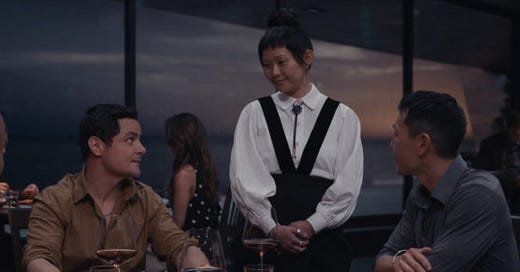


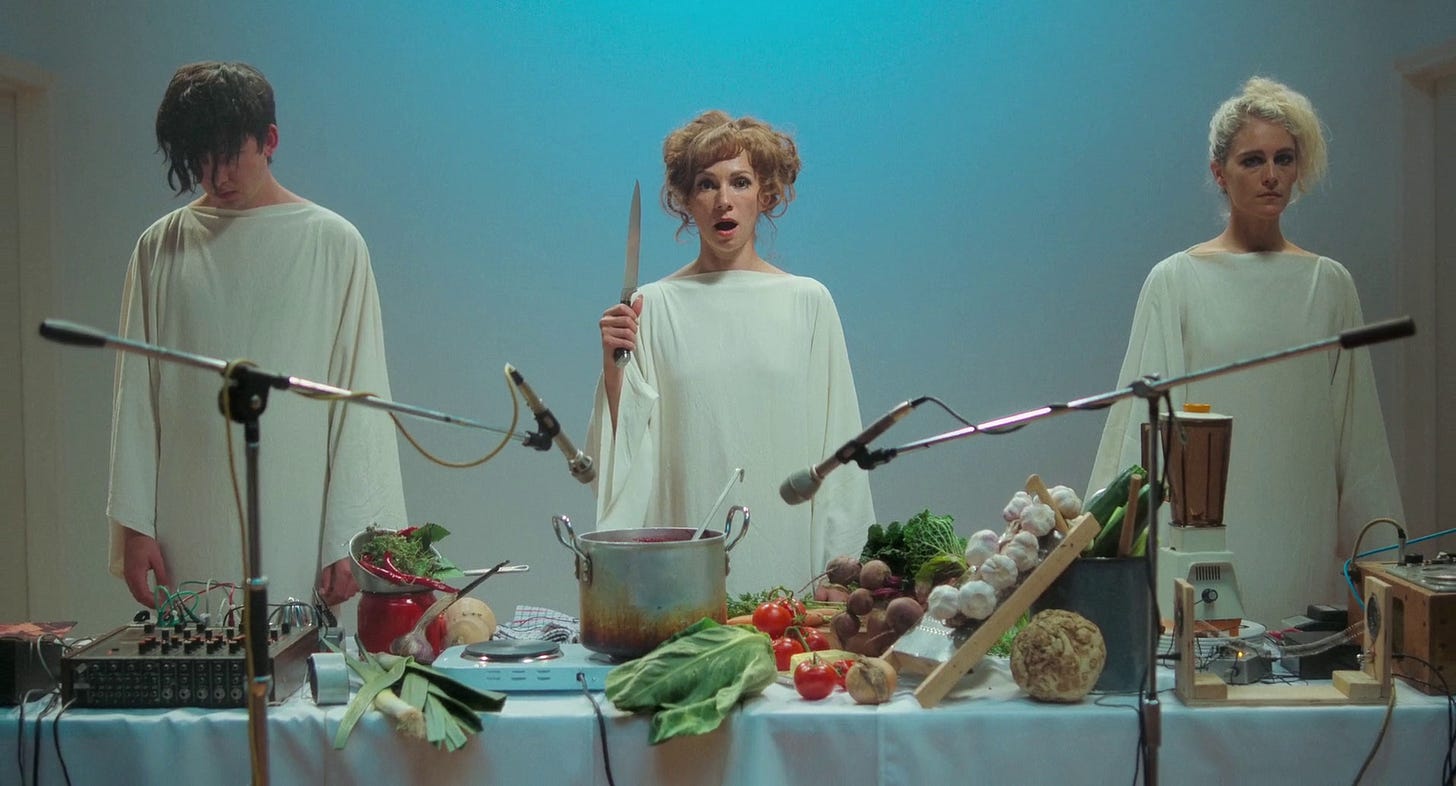
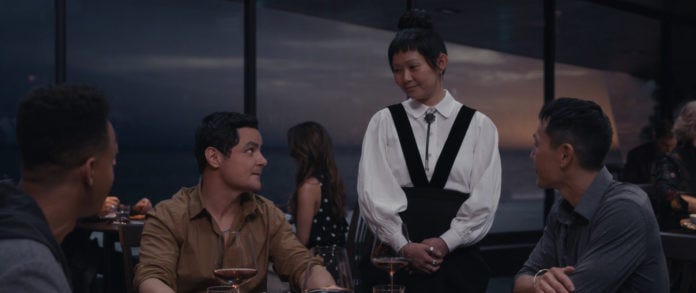

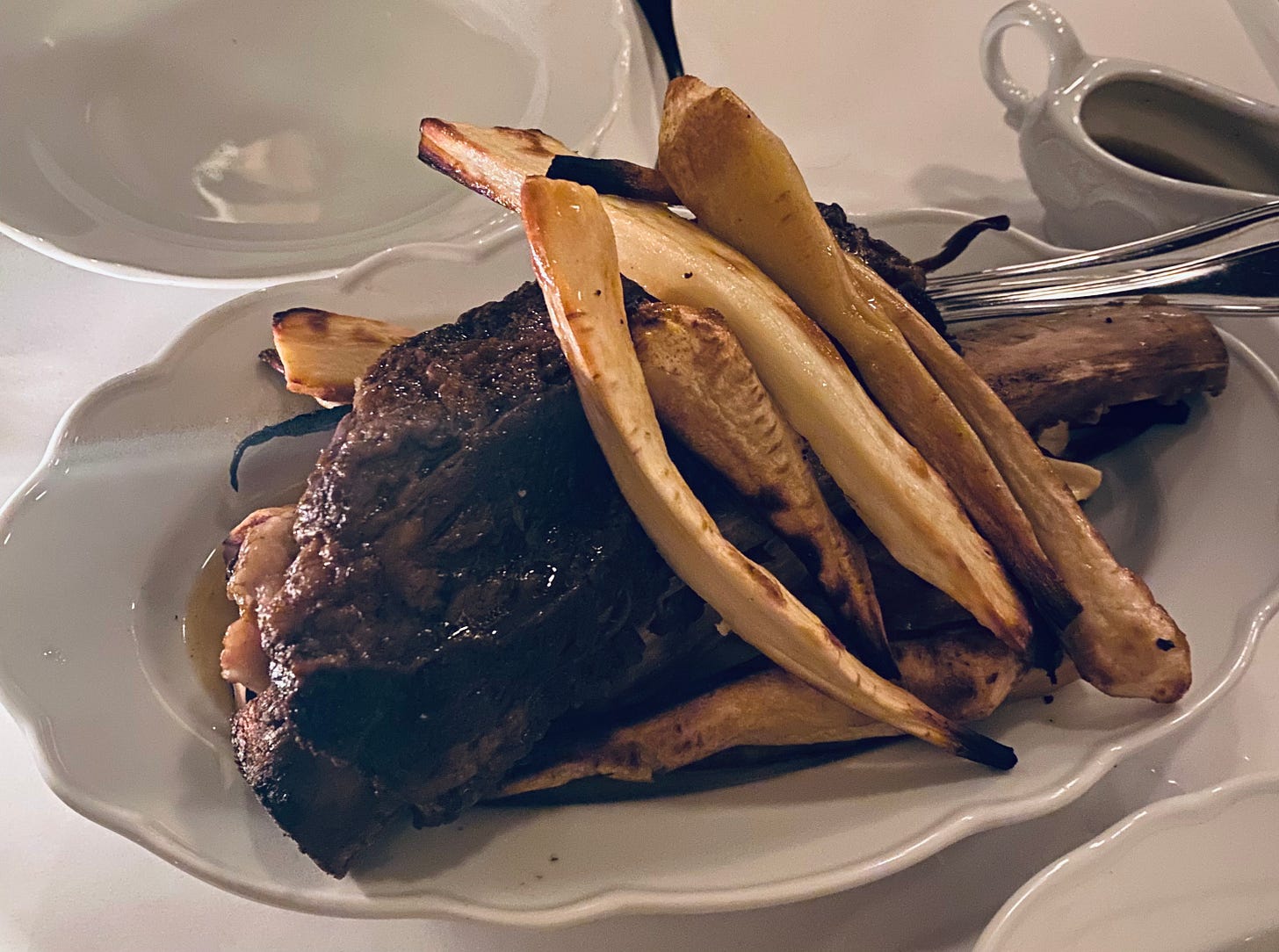
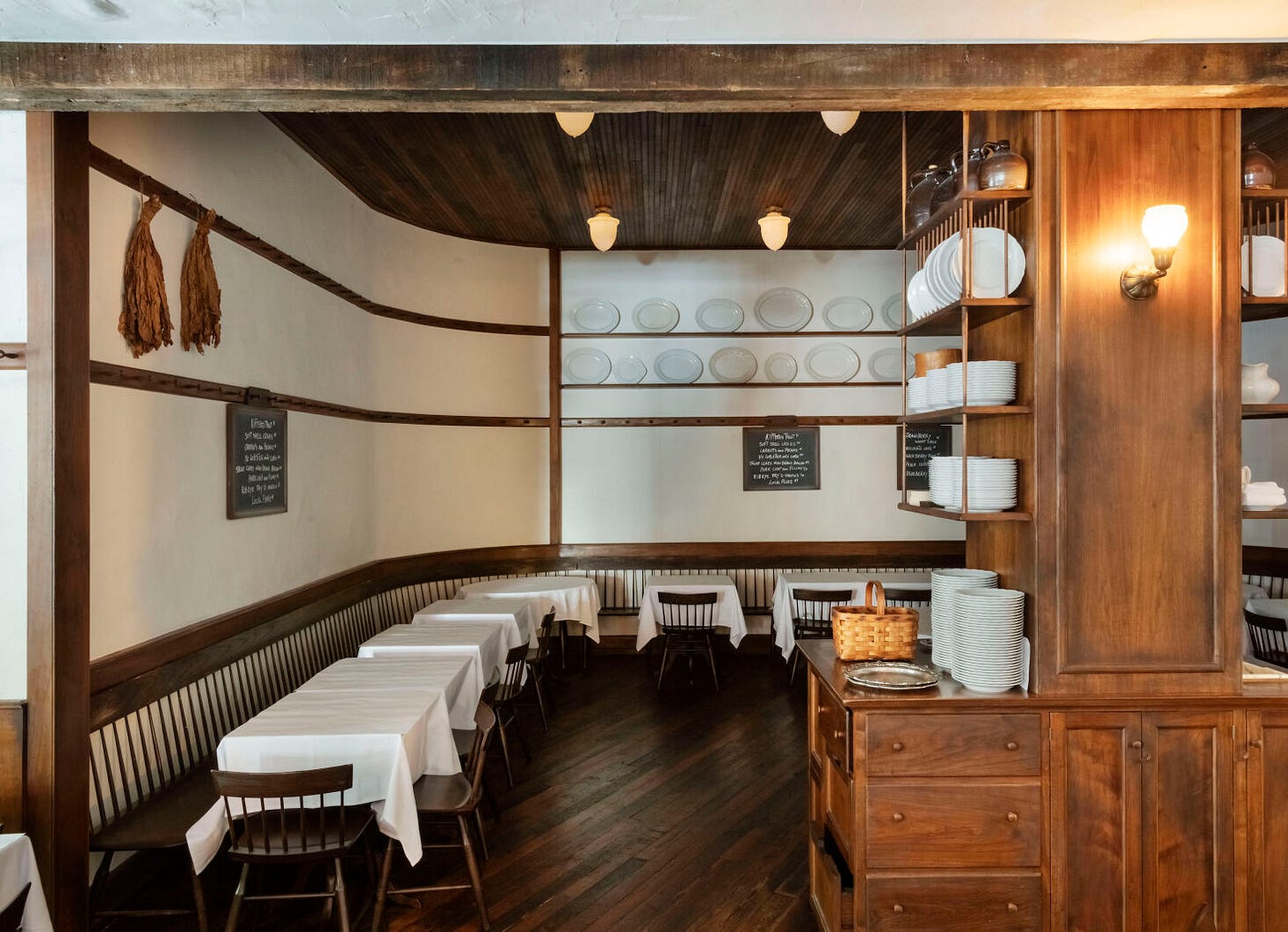
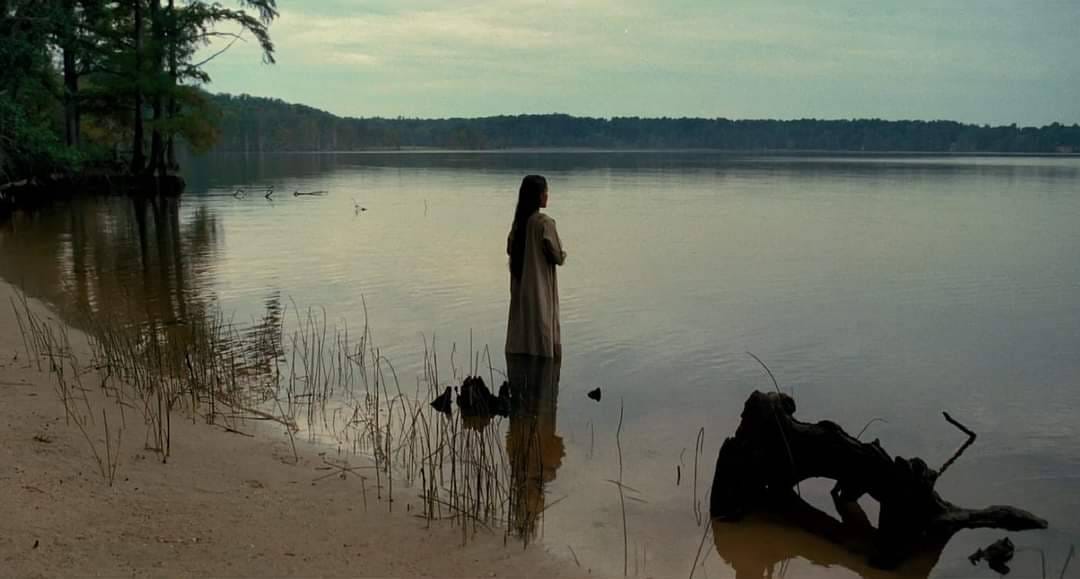
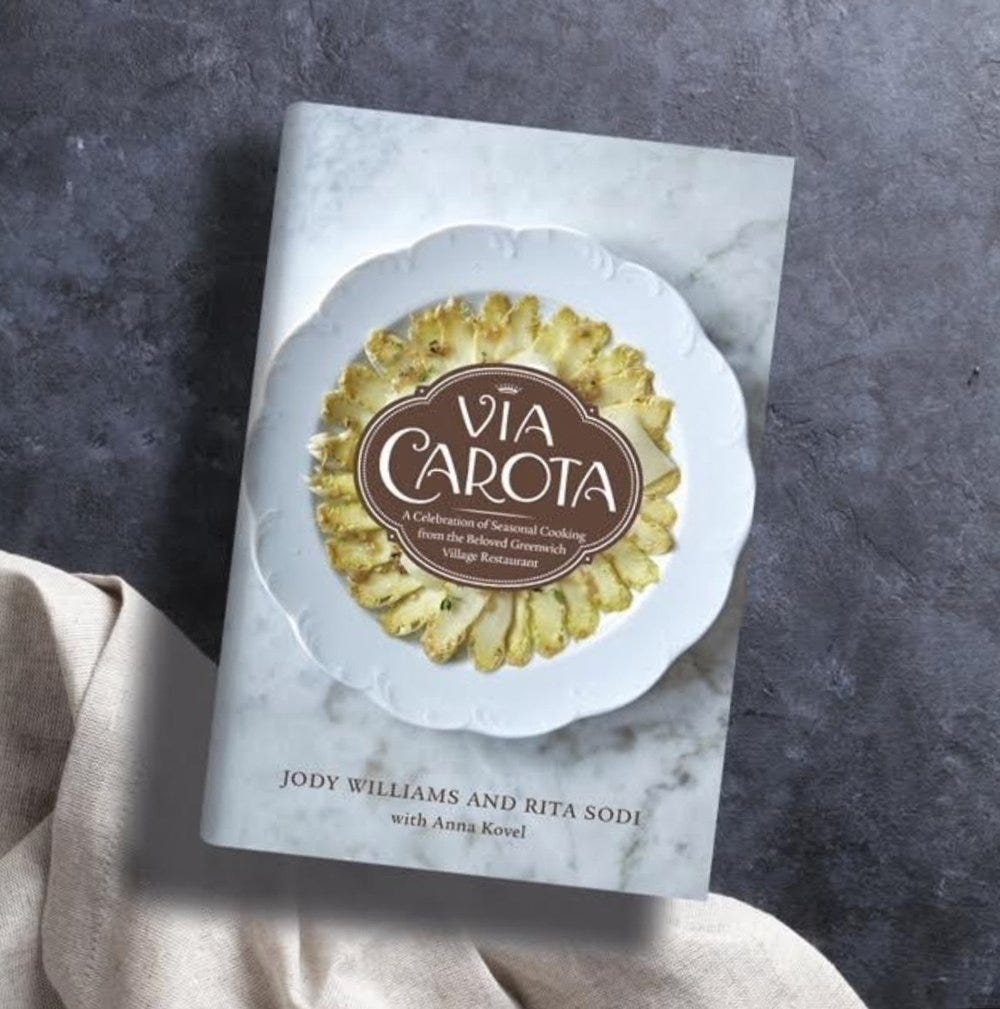

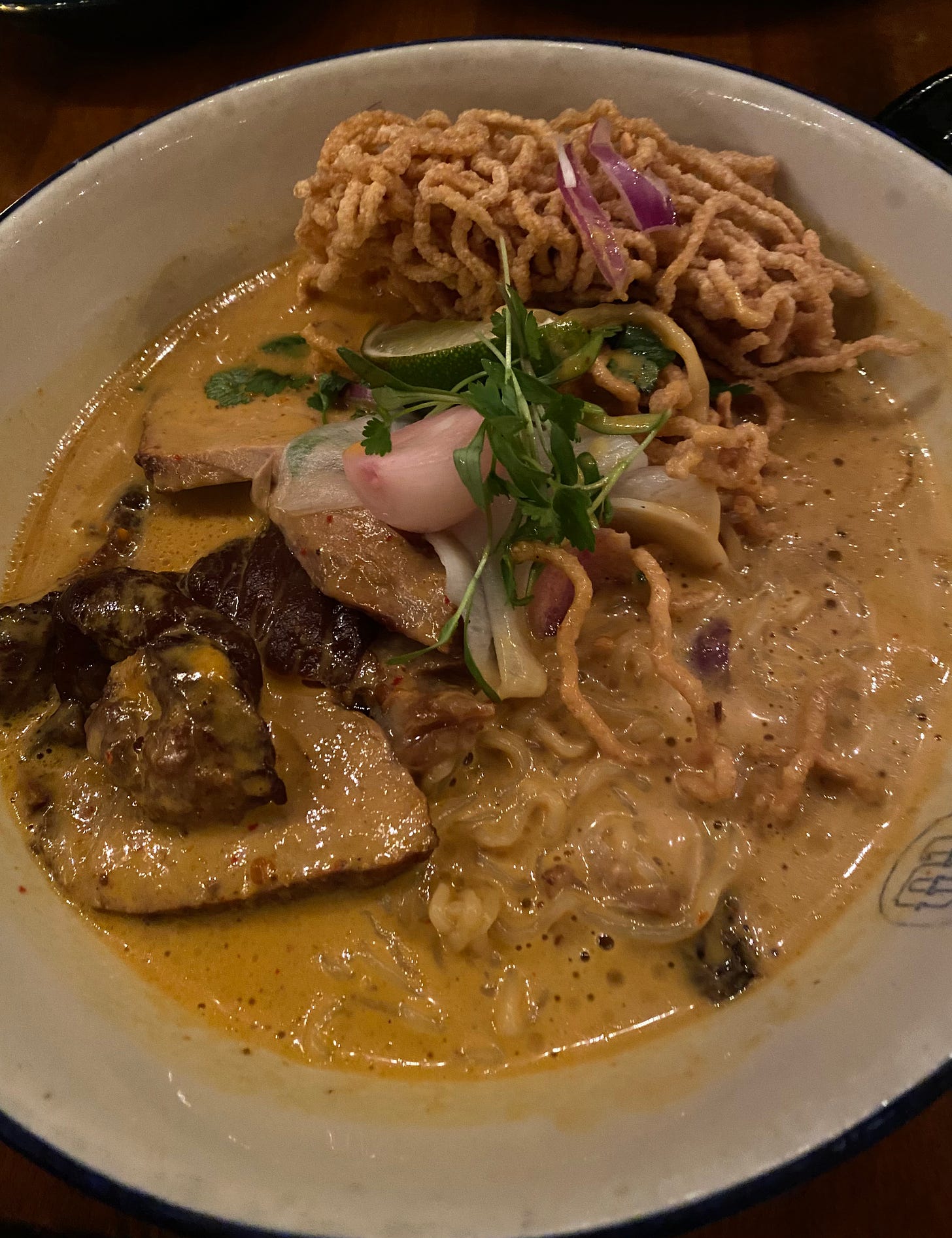
I love Hong Chau!! So cool to see you had a chance to talk to her.